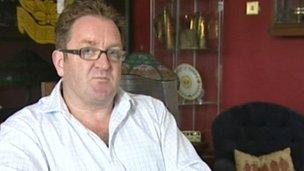Bosnia tour remembered by returning ex-Army captain
- Published

Maurice Evlyn-Bufton was a young Captain on his first tour to Bosnia as a peace-keeper in 1994
"It was reminiscent of photographs of the Blitz. Imagine the burning shells of houses in the East End and hollow eyes looking out of blackened windows."
That was the first taste of Bosnia for Maurice Evlyn-Bufton, who days earlier had arrived on a mission to keep the peace.
"Every single building was peppered and pottered with the signs of warfare," he said, describing the city of Mostar as his battalion made its way to its destination.
He was among 350 soldiers from the Royal Gloucestershire, Berkshire and Wiltshire Regiment (RGBW) posted to Gorazde in 1994-1995.
Conflict had broken out between Muslims and Croats in what was Yugoslavia and the United Nations had enlisted the RGBW to patrol a safe haven in the Bosnian city.
'Surreal memory'
During that tour of duty the regiment lost three soldiers - two from Wiltshire and one from South Gloucestershire. A fourth soldier from Dorset also died in the same year.
Their lives are now to be remembered as two stone memorials, mounted to mark their deaths but later removed, have been returned to the Bosnia and will be rededicated on Wednesday.
Mr Evlyn-Bufton, an ex-Captain with the regiment, described his initial memories as "from the sublime to the ridiculous".
"The first surreal memory I had was an image of 155 soldiers coming through the 'nothing to declare' barrier in Split airport in combat gear, with SA rifles, and 120 rounds of ammunition each in their pockets.
"We then went down and stayed in a former five star hotel on the Adriatic and I remember looking down in the swimming pool where the majority of our soldiers were taking a swim in the sun with their weapons, helmets and jackets strewn around the side of the pool.
"In the pool all you could see was young men in their Union Jack boxer shorts enjoying the sun."
The reality soon dawned as the following day the troops drove further down the Adriatic coast to spot the "terra-cotta roofs of Dubrovnik being bombarded by the Serbs".
'Deal with the past'
The battalion had "very limited exposure to operational environments", according to Mr Evlyn-Bufton, and this was its first tour.
Four deaths resulted, each accidental, with the three soldiers from the West - Privates Phillip Armstrong, Martin Dowdell, and Chris Turnerost - killed in a road accident in Gorazde while on duty.
Pte Ben Hinton, from Christchurch, Dorset, died in a separate accident that year.

Maurice Evlyn-Bufton lost four of his fellow soldiers
"I think it was a moment of realisation of the environment that we were in," said Mr Evlyn-Bufton.
"We were in an operational environment and actually part of that environment, our purpose, was fundamentally that lives could be lost."
Memorials were erected in-situ and marble plaques were carved by a Bosnian refugee.
However, in 2007 at the end of the British mission and in accordance with Army policy, all such memorials were officially returned to the UK.
They have been in storage at the Regimental Office in Gloucester ever since but now a group of volunteer ex-RGBW soldiers have raised £9,000 to return the memorials to their original locations.
"If we can recognise the service of the whole battalion, and the British Army, and what we did in our time, by the rededication of these memorial stones, then I think it will serve many people in many different ways.
"To help them deal with the past, have a sense of putting things to rest, will also help them embrace a sense of pride about what they did, because they should be proud."
- Published25 May 2012